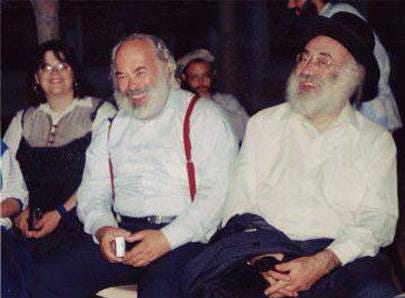Hello, friends, and thank you for your continued interest. Last week, I did something I seldom do: I saw a movie in a theatre. The last time I did that was 2019, and lest you think the pandemic forced it upon me, the time before that was 2011. I stopped going to movies when I married into Stolin, and even though I’m Modern Orthodox now, I’m not in the habit. I make exceptions only when the movie has special significance to me and when I don’t think I’ll get access on a streaming service. This movie was “Soul Doctor,” and it’s the story of the friendship between singer and civil rights activist Nina Simone and the singing rabbi Reb Shlomo Carlebach zt”l. Reb Shlomo and his much less famous twin Reb Elya Chaim were my first rabbis. So when I heard that there was a one-day showing of “Soul Doctor,” I immediately bought tickets.
Before I start my review, I have to give a disclaimer of sorts. Reb Shlomo was controversial in his lifetime, which is part of what the movie is about, and that notoriety continues to this day, even though he left the world in 1994. To put it bluntly, he’s a man with #MeToo accusations against him, and because of that, there are people who think his tunes should never be sung and the good side of his legacy should be forgotten. That really puts me in a bind. How can I forget my own life?
The movie opened with a message from Lisa Simone, who is Nina Simone’s daughter and the producer of the film. She spoke about unity and reaching across racial and cultural divides, which is what her mother and Reb Shlomo did with their friendship and musical collaboration. Then it cuts to a band of musicians. The leader got the members clapping out a beat. As the most enthusiastic member of the movie theater audience, I clapped along.
“Now we’re going to do a call-and-response,” he announced. “I’ll sing a lyric, and you repeat it back.”
When he sang the lyric, I gasped. It was Hebrew. Ki va mo’ed. The time has come.
That gives you a sense of what the movie is like, at least musically. It’s mostly Reb Shlomo’s tunes, but with new English lyrics telling the story. At other points, the music is set in a brand new style. Here’s “Ki Va Mo’ed” sung as gospel.
The movie tells the story of Reb Shlomo’s early life, not just how his family got out of Europe in the nick of time, which I already knew a little about, and not just his stint at the House of Love and Prayer with the “holy hippelach,” which I also knew something about. It was about what happened in between. It was a transition for him, just as becoming frum, marrying Chassidish, and becoming Modern again have all been transitions for me.
Reb Shlomo met Nina Simone in 1959, a yeshiva student venturing into a jazz bar. He could see that the Judaism being given over to the next generation was lifeless and alienating. He was literally looking for a way to jazz it up, and she helped him find it. She also persuaded him that he would have to drop the restriction of not touching women. Of course, that is what got him in trouble later, but while I do believe he sometimes got “handsy” with women who didn’t want it, I also believe the account of the movie. He dropped those restrictions with reluctance because he thought it was necessary. I will also add that although he hugged me many times in the years that I knew him, it was never, ever sexual.
I’m not going to spoil the whole movie by summarizing it, but I highly recommend you see it. The message is beautiful, and the music rocks. But my review would be incomplete if I didn’t share the most emotional part of the experience for me. It was when young Reb Shlomo was quarreling with his father, the eminent Rav Naftali Carlebach zt”l. “How many souls have you awoken?” his father accused.
“This one, sitting in the audience,” I thought. “I’ve got a son learning full-time in Jerusalem right now.”
His own father didn’t see his vision. He faced critics in his lifetime and beyond. But he was right. He saved generations of Jews. I’m living proof.






I enjoyed reading this!